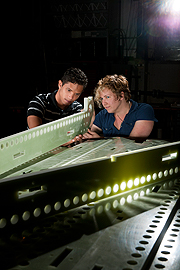Students help MicroBooNE clean up for its big debut
 |
High school physics teacher Daniel Gutierrez and Fermilab physicist Jennifer Raaf inspect a beam composed of G10 polymer, which will provide part of the structural support for the future MicroBooNE time projection chamber. Photo: Reidar Hahn |
The interior of Fermilab’s Lab F, located near the geodesic dome, looks like a massive construction site. Strewn across the lab are boxes containing metal parts and beams composed of G10 polymer, the same material from which circuit boards are made. In a closed cleaning area at one end of the building, postdoctoral fellow Thomas Strauss is cleaning domed steel caps.
These are all parts of the time projection chamber of the MicroBooNE experiment. Fermilab physicist Jennifer Raaf, one of the managers for MicroBooNE assembly, describes the TPC as the “guts” of the project, and plenty of people are helping her build it. Postdocs like Strauss, graduate students and undergraduates from collaborating universities are cleaning and testing all of the parts for the TPC’s eventual construction in a clean area in the DZero building.
The TPC, which will eventually be housed in the Liquid Argon Test Facility, will measure neutrino impacts on argon atoms by detecting their remnants, mainly electrons, muons and pions. It needs to be as clean possible before it is placed into a cryostat and submerged in liquid argon. Metal dust or grease smudges could interfere with the TPC’s ability to detect electrons and muons. That’s where the summer students come in.
“We’ve been receiving TPC parts from industry for the past month or so,” Raaf said. “The summer students are helping to scrub everything well at Lab F.”
Christie Chiu and Kathleen Tatem, undergraduates from MIT and Columbia University respectively, expressed enthusiasm for being able to work on MicroBooNE. In addition to cleaning parts, they have been testing electronics and coding software for, among other things, a new light collection system.
“This is new technology that will have lasting impacts on other experiments,” Chiu said. “It’ll be felt decades into the future.”
Daniel Gutierrez, a high school physics teacher from Puerto Rico, is also lending a hand. He is a participant in Fermilab’s TRAC program, which allows teachers to experience the life of a particle physicist over the summer by shadowing one. In turn, the teacher can help increase student interest in science.
“I’ll put together a set of photographs for them to get more interested,” Gutierrez said. “And I’ll have a class with some demonstrations related to the data MicroBooNE takes.”
Raaf said she hopes to have the structural frame of the TPC fully constructed by the end of summer and the cryostat electronics installed on the TPC when they arrive next spring. After researchers build the TPC in the clean area at DZero, they will test it, seal it inside the cryostat and lower the whole thing underground into the Liquid Argon Test Facility by late 2013.
—Joseph Piergrossi
|